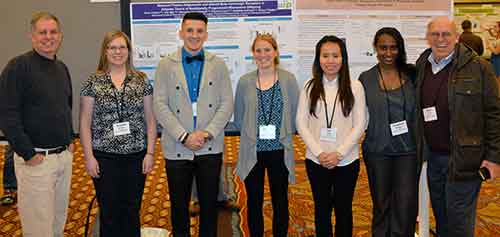Several Warner Pacific students attended the annual Murdock College Science Research Conference (November 17 and 18, 2014). Warner Pacific Biological Science major, Anh Ngo presented the College’s research project entitled: “Is reduced adiponectin mRNA associated with alterations in transcription factor ATF3 in adipose tissue of nutritionally programmed microswine offspring?”
One of her co-authors, Almir Celebic, presented a poster at the conference entitled: “Reduced plasma adiponectin and beta-adrenergic receptors in adipose tissue of nutritionally programmed microswine offspring.”
Both students did their research with Elizabeth DuPriest, Ph.D., Chair of the Department of Natural Sciences and Health and Associate Professor of Biology, at the Portland VA Medical Center. Both are continuing with the research and will write a senior thesis based on their findings.
According to Dr. DuPriest, “The idea behind our research is that a mother’s diet (and other environmental factors, before and during childhood) can negatively influence the way a child develops. This can permanently ‘program’ the individual for higher risk of cardiovascular and metabolic disease later in life. We are trying to discover what the links are between early environment and later health. Adiponectin is a beneficial hormone that is changed in offspring by maternal diet in our research, and we are trying to learn more about it.”
The students involved in the presentation included: seniors Anh Ngo, Brianna Cowin, and Almir Celebic and junior Biruktawit Mengistu. Brianna, Anh, and Biruktawit have all expressed interest in either doing research or medicine for their careers, while Almir is planning to become a dentist.

Dr. Brad Tripp, Dr. Elizabeth DuPriest, Almir Celebic, Brianna Cowin, Anh Ngo, Biruktawit Mengistu, and Dr. David Terrell
Here is Dr. DuPriest’s complete summary of the research presented for the Conference:
The idea behind our research is that a mother’s diet (and other environmental factors, even during childhood) can negatively influence the way a child develops. This can permanently “program” the individual for higher risk of cardiovascular and metabolic disease later in life.
We previously published data showing that microswine (pigs) whose mothers were fed a low protein diet have low mRNA levels of adiponectin, a beneficial hormone made in adipose (fat) tissue. (mRNA is the cellular “instructions” used to direct the production of specific proteins.)
Anh and Almir’s work focused on why that is true, and whether the actual adiponectin hormone levels in blood are also low.
Anh’s data (still preliminary) are showing that if you put the “programmed” offspring on a calorie-restricted diet after weaning, they have an abnormal response in their adipose tissue compared to how normal offspring respond to calorie restriction. This may indicate that typical lifestyle interventions that help normal individuals lead healthy lives may not work the same way in those who had a suboptimal early environment. We don’t yet know whether this abnormality is beneficial or detrimental.
Almir’s data show that the actual circulating levels of adiponectin in the blood are reduced, except in male “programmed” offspring that are also calorie restricted after weaning. They actually have higher adiponectin hormone.
